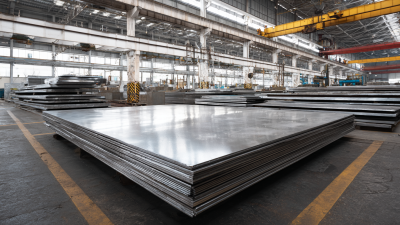The Ultimate Guide to Choosing the Right Aluminum Forging Bar for Your Project Needs
Table of Contents
- Understanding the Basics of Aluminum Forging Bars: Types and Specifications
- Key Factors to Consider When Selecting Aluminum Forging Bars for Applications
- Evaluating Mechanical Properties: Strength, Toughness, and Ductility in Forging Bars
- Cost-Effectiveness Analysis: Budgeting for Your Aluminum Forging Bar Project
- Industry Standards and Certifications for Aluminum Forging Bars Explained
- Exploring the Advantages and Applications of High Quality 6061 and 7075 T652 Aluminum Forging Bars in Various Industries
- FAQS
- Conclusion
- Related Posts
In the fast-paced world of manufacturing, picking the right Aluminum Forging Bar is pretty key if you want your project to turn out well. I came across a recent report from the Aluminum Association that predicts the demand for aluminum parts, including forging bars, will be going up by about 5% each year over the next five years. This growth is mainly fueled by new tech in cars and aircraft — you know, automotive and aerospace stuff. It really highlights how important it is for engineers and project managers to make smart, informed choices when sourcing aluminum materials.
John Smith, a seasoned engineer at Global Aluminum Solutions, puts it simply: 'Choosing the right Aluminum Forging Bar can really make a difference in how your final product performs and lasts.' His advice reminds us that it's crucial to understand what each project demands — think about mechanical properties, sizes, and what the forged parts will be used for. Taking the time to evaluate all these factors doesn’t just boost the quality of the end product but can also save money in the manufacturing process.
As we go through the top five things to keep in mind when selecting an Aluminum Forging Bar, it’s worth remembering just how versatile this material is. From making car parts to aerospace components, precision and reliability are everything. By making an informed choice here, you’re setting yourself up for a smoother, more successful project — it’s all about laying a solid foundation for sustainability and success.
Understanding the Basics of Aluminum Forging Bars: Types and Specifications
When selecting the right aluminum forging bar for your project, it's essential to first understand the various types and specifications that cater to different applications. Aluminum forging bars are typically categorized based on their alloy composition, with 6061 and 7075 being the most common grades used in engineering and manufacturing. The choice of alloy affects the strength, weight, and machinability of the final product. According to a report by the Aluminum Association, the demand for high-performance aluminum alloys has surged, mainly driven by their lightweight properties and corrosion resistance in aerospace and automotive industries.
Tips: When choosing an aluminum forging bar, consider evaluating its mechanical properties, including yield strength and tensile strength, which can significantly influence the performance of your application. Refer to the ASTM standards to ensure the bars meet the required specifications.
Additionally, thickness and diameter variations in aluminum forging bars can have a significant impact on their usability. Thicker bars offer enhanced strength, but they might complicate manufacturing processes. An industry report from Grand View Research highlights that the global aluminum forging market is expected to reach $12.56 billion by 2025, underscoring the importance of choosing the right specifications early in the project development to ensure both performance and cost-efficiency. Adjusting the bar length and machining tolerances according to your project's requirements can also improve the overall outcome and reduce waste.
Key Factors to Consider When Selecting Aluminum Forging Bars for Applications
When selecting aluminum forging bars for your project needs, it's essential to consider various key factors that influence performance and application suitability. The properties of aluminum, including its high strength-to-weight ratio and excellent corrosion resistance, make it a popular choice across many industries. According to recent market research, the global aluminum forging market is estimated to reach approximately USD 23.93 billion in 2024, with a projected growth rate of 7.0% from 2025 to 2030. This growth indicates a rising demand for high-quality aluminum forging solutions that meet specific project requirements.
Another critical consideration is the market dynamics in North America, where the aluminum extrusion market is projected to grow significantly. Forecasts suggest that the North America aluminum extrusion market will expand from USD 9.99 billion in 2024 to over USD 18.56 billion by 2033. When choosing an aluminum forging bar, understanding the applications and end-use sectors can help you determine the right grade and alloy, ensuring optimal performance for transportation, construction, or packaging purposes. These insights emphasize the importance of selecting aluminum forging bars that align with the evolving demands of the industry.
Evaluating Mechanical Properties: Strength, Toughness, and Ductility in Forging Bars
When selecting the right aluminum forging bar for your project, understanding the mechanical properties—strength, toughness, and ductility—is crucial. The mechanical strength, typically measured in megapascals (MPa), is pivotal in determining the bar's ability to withstand loads without deformation. According to industry data, aluminum alloys, particularly those in the 6000 series, offer exemplary tensile strengths ranging from 200 to 350 MPa, making them suitable for structural applications in industries like aviation and aerospace.
Toughness, which reflects a material's ability to absorb energy and plastically deform without fracturing, is another vital property. Aluminum forging bars possess high toughness, particularly the 7000 series alloys used extensively in aerospace applications. Their toughness can reach values of up to 30 J, ensuring reliability in extreme conditions. Ductility, defined by elongation percentages, indicates how well a material can be stretched without breaking, with many aluminum forging bars exhibiting elongation rates of over 15%. This combination of mechanical properties enables aluminum products, from plates to rods, to perform excellently in demanding environments such as shipbuilding and aviation. At Shanghai Miandi Metal Group Co., Ltd., we provide a wide range of aluminum products from the 1000 to 8000 series, tailored to meet these critical mechanical requirements.
Cost-Effectiveness Analysis: Budgeting for Your Aluminum Forging Bar Project
When undertaking a project involving aluminum forging bars, understanding the cost-effectiveness of your choices is crucial. Different grades of aluminum and varying sizes can significantly affect the overall budget. Therefore, it's important to analyze not only the initial cost of materials but also the long-term benefits they may offer, such as durability and resistance to corrosion. Selecting the right aluminum forging bar should align with both your financial constraints and the specific requirements of your project.
Budget considerations can vary widely depending on the intended use of the aluminum forging bar. For instance, if you are constructing components for high-performance applications, investing in higher-grade materials may be justified despite the upfront costs. On the other hand, more economical options might be suitable for general-purpose projects. By carefully evaluating your project's needs and potential return on investment, you can make informed decisions that balance quality and cost, ultimately enhancing the success of your project while maintaining fiscal responsibility.
Industry Standards and Certifications for Aluminum Forging Bars Explained
When selecting aluminum forging bars for your project, understanding industry standards and certifications is crucial. These guidelines ensure that materials meet specific mechanical properties and performance requirements. Major certifications include ASTM International and ISO standards, which dictate the quality and safety of aluminum forging products. Familiarizing yourself with these standards not only aids in compliance but also helps in selecting the right material that fits your project's needs.
Tips for navigating aluminum forging standards: always check for the specific certification that applies to your project's requirements. For instance, if you need aluminum that withstands high temperatures or corrosion, look for bars certified for those properties. Consulting with suppliers about their certifications can also provide reassurance regarding the material's integrity and performance.
Another essential aspect is to consider the source of your aluminum forging bars. Reputable manufacturers will often highlight their compliance with applicable standards in their product data sheets. This transparency can save you from potential project delays and issues down the line. Always request documentation of certifications when purchasing your materials to ensure you are making an informed choice.
The Ultimate Guide to Choosing the Right Aluminum Forging Bar for Your Project Needs
| Grade | Alloy | Typical Applications | Mechanical Properties | Standards & Certifications |
|---|---|---|---|---|
| 6061 | Aluminum-Silicon-Magnesium | Marine, Automotive, Aerospace | Yield Strength: 240 MPa, Tensile Strength: 310 MPa | ASTM B221, ISO 8362 |
| 7075 | Aluminum-Zinc-Magnesium-Copper | Aerospace, Military | Yield Strength: 570 MPa, Tensile Strength: 700 MPa | AMS 4045, ASTM B838 |
| 2024 | Aluminum-Copper | Aerospace, Structural | Yield Strength: 300 MPa, Tensile Strength: 450 MPa | AMS 4120, ASTM B229 |
| 6063 | Aluminum-Magnesium-Silicon | Architectural, Structural | Yield Strength: 240 MPa, Tensile Strength: 310 MPa | ASTM B221, ISO 209 |
Exploring the Advantages and Applications of High Quality 6061 and 7075 T652 Aluminum Forging Bars in Various Industries
The use of high-quality aluminum forging bars, particularly those made from 6061 and 7075 T652 alloys, is becoming increasingly prevalent across various industries due to their exceptional mechanical properties. These alloys are renowned for their superior strength, durability, and corrosion resistance, which makes them ideal candidates for demanding applications. When subjected to the forging process, our forged rods exhibit incredible consistency, ensuring that manufacturers can rely on them for high-performance outcomes in critical projects.
In industries such as aerospace, automotive, and construction, the importance of using reliable materials cannot be overstated. Our aluminum forged bars are engineered to meet the rigorous demands of these sectors, where failure is not an option. The combination of 6061 and 7075 T652 aluminum allows for a versatile range of applications, from structural components to intricate parts requiring precise tolerances. Professionals around the globe repeatedly turn to our products, confident that they will deliver the quality and performance needed in their operations. The reliability and strength of these forging bars position them as the preferred choice for businesses aiming to enhance their manufacturing processes.
FAQS
: The key mechanical properties to consider are strength, toughness, and ductility.
The mechanical strength is typically measured in megapascals (MPa).
Aluminum alloys in the 6000 series offer tensile strengths ranging from 200 to 350 MPa.
Toughness indicates a material's ability to absorb energy and plastically deform without fracturing.
The 7000 series alloys are known for high toughness, with values reaching up to 30 J.
Ductility is defined by the percentage of elongation before breaking, with many aluminum forging bars exhibiting rates over 15%.
Analyzing cost-effectiveness helps balance initial material costs with long-term benefits like durability and corrosion resistance.
Budget considerations can vary widely; higher-grade materials may be necessary for high-performance applications, while economical options may suit general-purpose projects.
Evaluating project needs and potential return on investment helps make informed decisions that balance quality and cost.
They provide a wide range of aluminum products from the 1000 to 8000 series, tailored to meet critical mechanical requirements.
Conclusion
When choosing the right Aluminum Forging Bar for your project, it's essential to understand the various types and specifications available. Factors such as application requirements and mechanical properties like strength, toughness, and ductility play a crucial role in selecting the most suitable forging bar. A thoughtful cost-effectiveness analysis can help budget for your project, ensuring that you maximize value while meeting performance standards.
Additionally, awareness of industry standards and certifications is vital for ensuring that the aluminum products meet safety and quality benchmarks. Companies like Shanghai Miandi Metal Group Co., Ltd. offer an extensive range of aluminum products, including Aluminum Forging Bars, which are widely utilized in critical sectors such as aviation and shipbuilding. By considering these elements, you can make more informed decisions that align with your project's specific needs.
Related Posts
-

How to Choose the Right 6061 Aluminum Plate Brand for Your Needs
-

2025 Copper Price Forecast Unveiling 5 Trends Every Global Buyer Must Know
-

Evaluating the Top Brands for 6061 Aluminum Plates: A Data-Driven Comparison
-

Understanding the Factors Influencing Aluminum Plate Prices: Market Trends and Data Insights
-

Exploring the Advantages of 2024 Aluminum Sheet: A Data-Driven Analysis of Strength and Durability
-

Top Strategies for Sourcing Quality Aluminum Plates from China Manufacturers
Blog Tags:


